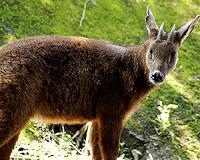| . |  |
. |
Gothenburg, Sweden (SPX) Apr 20, 2011 Active efforts are required to preserve biodiversity in the seas - that far most people are in agreement. But in our enthusiasm to save uncommon species, we sometimes miss the common species that form the basis of marine ecosystems. 'Change strategy' is the challenge to the authorities from researchers at the University of Gothenburg, Sweden. An inconceivably large proportion of the animals that live in the seas are so uncommon that it is difficult to find more than a few specimens. Committing most resources to saving individual species is not just an expensive business - it would also risk destroying the foundation for ecosystems, the research of Professor Kerstin Johannesson shows. Her research team is able to demonstrate that it is the common species that are of really great significance for ecosystems, by establishing habitats for other species. It is therefore in all probability the most common species that determine the future of all species. If the common species disappear, it will have great consequences. An alarming example of what can happen is that the cod populations in the fjords of the Bohuslan coast have almost without exception disappeared. These fjords have consequently lost one of their most important species. It can have far-reaching consequences for several other species when the environments of the shallow bays change. "Without the big predatory fish, the sea-grass meadows become clogged, with the result that the shallow bays no longer act as larders and nurseries for inshore fish. While life slowly dies out, the blame is put on eutrophication." Kerstin Johannesson's research is concerned with how different populations within one species may be so genetically different that they actually do not have very much to do with each other, and that in particular they are not interchangeable. If a local population disappears, it will not automatically be replaced by individuals from another population migrating in. In the worst case, even individuals of the other population are unable to cope in the environment of the extinct population. "That's how it is with the cod populations in Bohuslan. Despite tough restrictions on catches and despite North Sea cod visiting the Bohuslan fjords every year, we are not getting the cod populations back. A similar example is the cod off the coast of Newfoundland in Canada, which have not returned despite a complete halt to fishing for nearly 20 years." Focusing on the species in order to preserve species diversity in the seas is therefore an incorrect approach that may instead lead to greater losses. Despite this, there is a lack of legislation and recommendations today on how genetic variation within species should to be managed.
Share This Article With Planet Earth
Related Links University of Gothenburg Darwin Today At TerraDaily.com
 Taiwan gives China rare deer and goats
Taiwan gives China rare deer and goatsTaipei (AFP) April 17, 2011 Taiwan has given China a pair of endangered deer and one of indigenous goats, zoo officials said Sunday, in the latest piece of animal diplomacy after China gave its former arch-enemy two pandas. The two sika deer and two Formosan serows - both seldom seen in the wild - were transported Saturday to Liugong Island off China's Shandong province and were welcomed by over 500 people, the Taipe ... read more |
|
| The content herein, unless otherwise known to be public domain, are Copyright 1995-2010 - SpaceDaily. AFP and UPI Wire Stories are copyright Agence France-Presse and United Press International. ESA Portal Reports are copyright European Space Agency. All NASA sourced material is public domain. Additional copyrights may apply in whole or part to other bona fide parties. Advertising does not imply endorsement,agreement or approval of any opinions, statements or information provided by SpaceDaily on any Web page published or hosted by SpaceDaily. Privacy Statement |